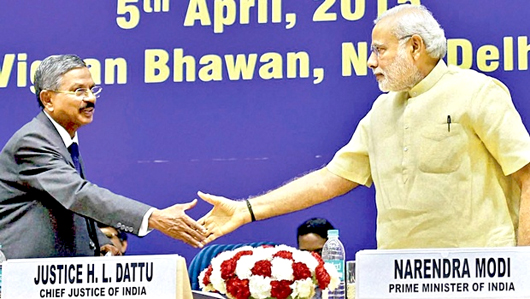New Delhi, Apr 6: Highlighting the lack of infrastructure and low judge-population ratio, Chief Justice of India Justice H L Dattu on Sunday said a decision has been taken to put a maximum time limit of five years to complete trial in a criminal case.

Giving information about the outcome of the joint conference of chief justices of high courts and chief ministers, he said: “We have taken a decision to try our best that five years should be the maximum time to finish a case (at the district level).”
“My priority is that it should not go beyond two years. But please keep in the mind judge-population ratio and the lack of infrastructure, too,” he said.
Earlier in the day, he said: “We must tackle the judge-population ratio (1:61,865) on a war-footing.”
Justice Dattu also said it has been decided that a committee would be formed by the CJI to look into the issue of the judicial service commission so as to ensure uniform policy in the selection of judges for the judiciary, particularly at the district level.
Responding to a query over delay in hearing of the December 16 Delhi gang-rape case, the CJI said the appeal filed by the four death-row convicts came to the SC only in 2014. “There are already 23 death reference cases pending in the SC. It (The Delhi case) will certainly be decided on priority if the matter is mentioned before the court,” he said.
Asked about former CJI Justice R M Lodha’s remark that courts should function on all 365 days, Justice Dattu said the Supreme Court works 190 days a year, but people are unaware that judges work 24x7 in all these days, and remaining period, they have to write judgments.
“It is not an easy life. Having 20 years’ experience as judge, I can say we work 24x7,” he said.
He said issues pertaining to computerisation of courts, continuation of evening courts, fast-tracking of cases pertaining to women, juveniles, the disabled, senior citizens and corruption, were also discussed in the conference attended by the chief justices of 24 high courts.
During the inauguration session, Justice Dattu had said issues pertaining to the delivery of justice, including the pendency of court cases, cannot be handled by the judiciary alone, and that the executive must extend a helping hand besides granting financial autonomy to allow spending of allocated funds and better pay packages for judicial officers to attract the best minds.
“The judiciary and Parliament are like siblings—both children of Democracy. We are obligated, on one hand, to support one another, and, on the other hand, to correct the other if they sway from the path laid down by our sacred Constitution,” he said.
Law Minister D V Sadananda Gowda said almost 96 per cent of district and subordinate courts have been computerised, providing online information to litigants and lawyers.





Comments
Add new comment